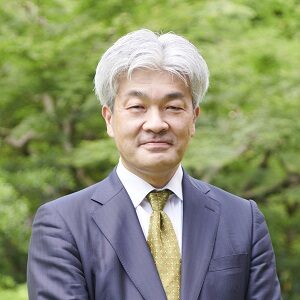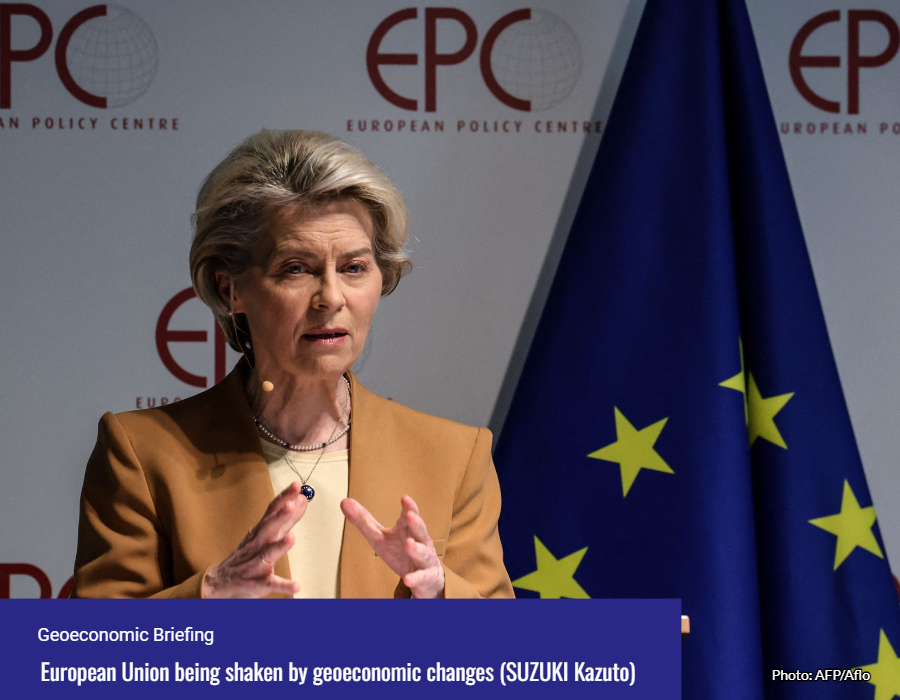Geoeconomic Briefing No.165 October 12, 2023
Economic Security Group
European Union being shaken by geoeconomic changes
Director & Group Head, Economic Security, Institute of Geoeconomics
Professor, Graduate School of Public Policy, The University of Tokyo
Discussions on economic security began in earnest in Japan and the United States during the COVID-19 pandemic, but the momentum was not so high in Europe. This was because the issue of economic security has been taken up by Washington and Tokyo mainly as a way to respond to Beijing’s economic coercion and concerns over excessive dependence on China. Countries that regard China as a national security threat or a rival in terms of strategic competition were forced to think of measures to fight coercive economic statecraft. Meanwhile, it had been rare for European countries to recognize China as a security threat due to their geographical distance. Rather, Europe had been eager to build economic ties with China as a top trading partner with a massive market.
However, such a trend has been changing greatly. Earlier this year, Ursula von der Leyen, president of the European Commission, the European Union’s executive arm, gave a speech on EU-China relations, followed by Germany’s announcement of its first-ever China strategy, both about reducing risks from economic dependency. Meanwhile, French President Emmanuel Macron, referring to the issue of Taiwan during an interview following his visit to Beijing in April, said Europe should not get “caught up in crises that are not ours.” His comments, which caused a stir, indicate gaps among European countries’ recognition of security threats.
This article will give an overview of how the EU has responded to geoeconomic changes amid the China’s rise.
De-risking in a European context
In thinking about the EU’s economic security, we should first look at a speech made by von der Leyen on de-risking. It is important to take note that the speech made on March 30 covered the EU’s China policy, which means the concept of de-risking is focused directly on supply-chain issues with China and not on supply chains and energy dependency with Russia which were decoupled due to sanctions against Moscow.
In the speech, the European Commission president said Chinese leader Xi Jinping “essentially wants China to become the world’s most powerful nation” and warned of the country’s “determination to promote an alternative vision of the world order.” At the same time, she expressed concern over China strengthening its relationship with Russia and failing to make efforts to stop the war in Ukraine; taking a more assertive stance including a show of military force in Asia; its grave human rights violations occurring in the Xinjiang Uyghur Autonomous Region; and its economic coercion against Lithuania which let Taiwan open a de-facto embassy in Vilnius.
However, von der Leyen has made clear her stance that Europe should focus on de-risking and not decoupling with China, saying that even though the country is gaining power, has ambition to form international order and is taking actions that go against European values, it is vitally important to ensure diplomatic stability and open communications with Beijing. In other words, she adopted a concept of de-risking to maintain a path of dialogue rather than completely cutting ties with China. At least in terms of its relationship with Beijing, the EU is apparently taking the issue as a probabilistic risk and aiming to reduce the likelihood of something unfavorable for the EU happening.
Strategic autonomy
Strategic autonomy, a key concept in economic security, has been discussed in Europe for some time. According to the European Parliament’s study on the EU’s strategic autonomy between 2013 and 2023, the concept in Europe developed between 2013 and 2016 as a way to reduce the region’s dependence on the United States for matters of security and defense. From 2017 to 2019, it was considered as a way to gain autonomy by becoming less dependent on the U.S. and the United Kingdom amid a geopolitical environment marked by U.S. President Donald Trump’s administration and Brexit. In 2020, the COVID-19 pandemic shifted the focus to mitigating economic dependence on foreign supply chains, and following the Russian invasion of Ukraine in 2022, Europe’s dependence on Russia’s energy resources came to focus.
In such circumstances, the idea that dependencies on third countries limit the EU’s capacity to act has been constantly discussed, leading to calls for such vulnerability to be overcome politically. Nevertheless, it is noteworthy that von der Leyen did not use the term “strategic autonomy” in her speech in March. This shows that the EU is not aiming for strategic autonomy in its China policies, but is setting strategic goals for increasing autonomy to reduce dependence on the U.S. in the field of security, on the U.K. after Brexit and on Russia for energy supply.
It appears that strategic autonomy in the EU is focused on securing the freedom to choose its own policies and mitigate influence from foreign countries, which could naturally lead to recognition that autonomy is also needed to fight against China’s economic coercion backed by the EU’s economic dependence on the country. The EU’s China policies, however, do not indicate that there is sufficient political will within the region to increase such autonomy and it looks like the major goal of its strategic autonomy largely remains becoming structurally independent from Russia and the U.S.
Economic security
In June, the EU released its first economic security strategy, adopting an approach based on keywords dubbed the three Ps: promotion, protection and partnering. By pushing the strategy forward, the EU aims to promote international competitiveness; protect data and technology from flowing out through foreign investment in and purchases of EU industries; and partner with countries who have common interests. The strategy states that in order to reach these objectives, the EU will assess risks affecting its economic security; engage in a dialogue with the private sector; conduct research and development to secure technological sovereignty and resilience; and review the foreign direct investment screening regulation. It also says the EU will fully implement export control regulation and address security risks related to outbound investments, the measures taken by the U.S., apparently taking into account Washington’s economic policy.
It becomes clear from the strategy document that the EU’s economic security strategy derives from strong concerns over issues related to screening of inbound investments and risks of technology leakage, as it has bitter experiences, particularly the 2016 purchase of German industrial robot manufacturer KUKA by a group of Chinese investors. Furthermore, the EU has been influenced by the policy led by the U.S. during the Trump administration to exclude Chinese companies from the 5G network. Worried that it will become difficult to share information with the U.S. unless the EU makes its network “clean,” the EU is also focusing on eliminating Chinese influence in telecommunications infrastructure.
In other words, supply chain cutoffs and intentional economic coercion are not necessarily major issues in the eyes of the EU, although that doesn’t mean it has no interest in the issues. The fact that China economically coerced Lithuania after it strengthened ties with Taiwan did serve as a trigger for the EU to create an economic security strategy and discussions have started on anti-coercion instruments, but they have not gone as far as being made into a strategy.
In the field of electric vehicles, which the EU regards as a major industry and key to its green transformation, Europeans are not only losing their share in the Chinese market because of Chinese firms’ growing presence, but are also seeing an increase in imports of Chinese-made EVs. Threatened by the situation, the European Commission launched an anti-subsidy investigation into EVs coming from China, sparking a strong backlash from Beijing. The EU’s China policy is increasingly facing an uphill battle from the aspect of industrial policy.
EU-Japan cooperation
Lastly, it needs to be discussed whether it is possible for Japan to cooperate with the EU, which is taking such an approach in its economic security policy. The EU’s economic security strategy, while taking China into account, appears to be more acutely intended to respond to Washington’s economic security measures, placing importance on the U.S.-EU relationship and avoiding being at a disadvantage regarding the U.S. Japan shares a common policy with the EU in this respect, but the first and foremost priority for Japan’s economic security is to counter China’s economic coercion, which is different from the EU’s priority. We must take note that while there appear to be areas in which Japan and the EU can cooperate, there are differences in their policy goals and awareness of threats.
Even so, the EU and Japan are facing the same direction in advancing de-risking with China while maintaining their economic ties with the country. The bloc has been more active than Japan in implementing measures to screen inbound investments and prevent technology outflow. As the EU is becoming increasingly aware of China’s economic coercion, Japan can cooperate with the bloc in various ways such as bolstering the resilience of supply chains. In the field of EVs in particular, where China is showing strong presence, there is a lot of room for Japan and Europe to cooperate to put themselves in a more dominant position. Japan and the EU have signed an Economic Partnership Agreement and a Strategic Partnership Agreement. Now is the time to fully utilize the agreements and start a dialogue to strengthen economic security cooperation in order to work together on anti-coercion instruments.
[Note] This article was posted to the Japan Times on October 12, 2023:
https://www.japantimes.co.jp/commentary/2023/10/12/world/european-union-geoeconomic-changes/
Author

Kazuto Suzuki
Director & Group Head, Economic Security, Institute of Geoeconomics
Professor, Graduate School of Public Policy, The University of Tokyo
Space policy / Non-proliferation / Export control / Sanctions
Geoeconomic Briefing
Geoeconomic Briefing is a series featuring researchers at the IOG focused on Japan’s challenges in that field. It will also provide analyses of the state of the world and trade risks as well as technological and industrial structures. (Editor-in-chief: Dr. Kazuto Suzuki, Director, Institute of Geoeconomics (IOG); Professor, The University of Tokyo)
Latest Contents
- 2024/07/01Expectations vs. reality of Xi Jinping’s charm offensive by Naoko Eto
- 2024/06/27What will it take for China to regain market confidence? by Tomoyuki Fukumoto
- 2024/06/09Does economic security undermine the benefits of interdependence? by Paul Nadeau
- 2024/05/31Europe’s vulnerability in the EU-China-U.S. geoeconomic triangle by Andrew Capistrano
- 2024/05/27How will Japan respond to new U.S. investment rules? by Satoshi Yamada
We’ll keep up to date on latest briefings, videos, events, research activities, media coverage, and more.
 APIニュースレター 登録
APIニュースレター 登録
